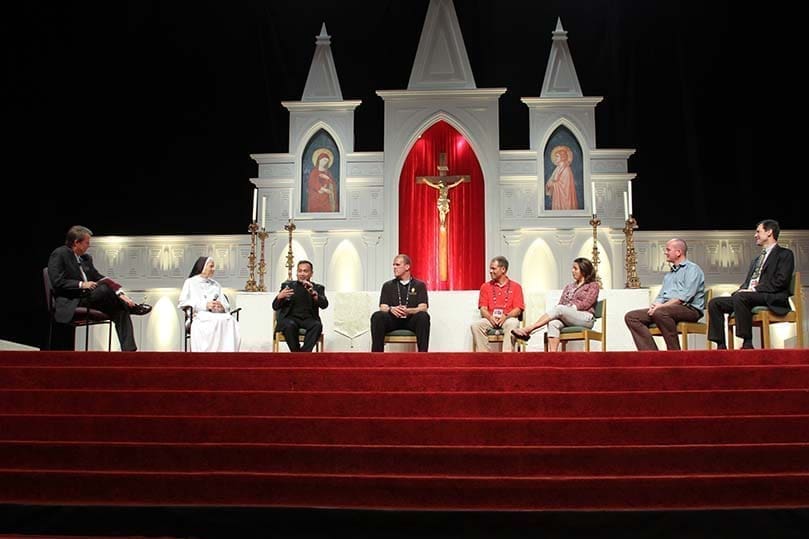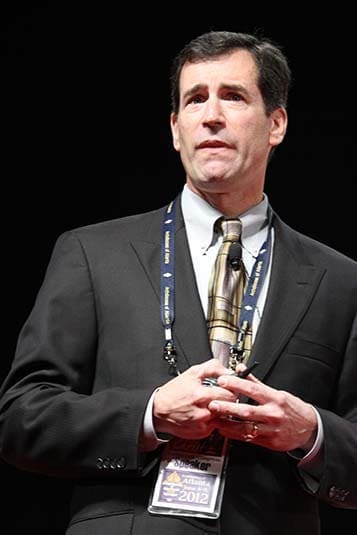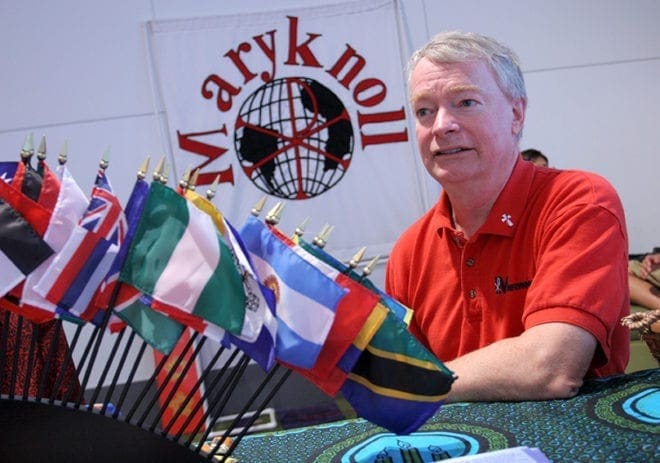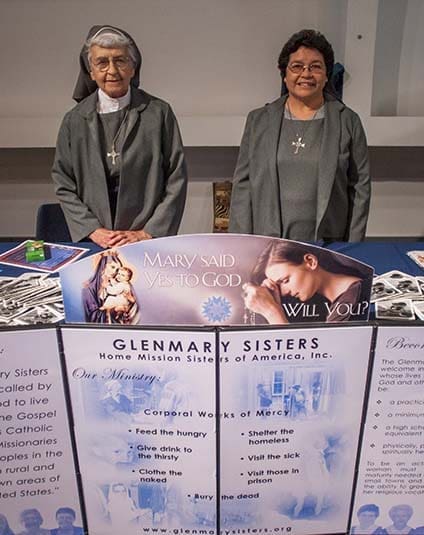 Photo By Michael Alexander
Photo By Michael AlexanderCollege Park
More Lay Catholics Hear Disciple’s Missionary Call
By STEPHEN O'KANE, Staff Writer | Published June 21, 2012
Mission work threaded through the 2012 Eucharistic Congress theme, “We Though Many Are One Body in Christ,” as speakers emphasized evangelization and Catholics’ call to minister to and serve the people of God.
“We are all missionaries,” said Father Liam Cummins, a native of Ireland and a Mill Hill Missionary in Africa for the last 20 years, during a panel discussion June 9 at the congress.
Father Cummins joined six others, including clergy, religious and lay people, in a candid discussion of their struggles and breakthroughs in mission work and its importance in the life of the Catholic Church.

St. Brigid Church parishioner Dr. Albert Nordine shares some stories about his mission trips to Nicaragua for Mustard Seed Communities in the English Track. Photo By Michael Alexander
Each panelist had something different to offer. Their lifestyles, apostolates and careers were as varied as their mission experiences. But there were some unifying factors.
“First of all, I wanted to prove to myself I’m not going to fail,” Father Cummins said as he described some of the challenges he faced when he first began.
“I found it extremely difficult because sometimes the mentality we have when we go on mission is, ‘I’m going to bring them something. I’m there, I’m going to make everything fine.’ But when you get there you realize you know nothing,” he said.
Father Cummins joined the Mill Hill Missionaries in 1986, when he was just 18. He first served as a lay missionary in Uganda, East Africa. In 1996, he was ordained a priest and then served in northern Cameroon where he was involved in primary evangelization and dialogue with Islam. He then spent nine years based in Nairobi, Kenya, where he helped to form others for missionary work and the priesthood.
If Your Wife Goes, What Happens Next?
Dr. Albert Nordone, a member of St. Brigid Church in Johns Creek who has had a dental practice in Atlanta for over 25 years, didn’t begin missionary work until later in his life.
The father of four, Nordone was skeptical when his wife, Daphne, first approached him about joining a mission trip to Nicaragua. Nordone said he was hesitant but felt it would be good for his wife to have the experience. After much prayer and discernment, they decided she should join the group from their parish on the trip.
“She had a fabulous experience. It was just terrific. The stories were amazing, the pictures she showed me were phenomenal, and I just loved hearing all about it,” Nordone said.
“And I thought, ‘Finally our lives can get back to normal,’” he said.
But his wife expressed such joy that she wanted to go again and this time bring him along. Six months later, they traveled to Nicaragua together for his first mission trip.
“I’ve got to tell you, I was hooked,” said Nordone. “I absolutely fell in love with the experience. I felt so at peace. I felt like I was really doing what I was called to do.”
Since then, over the last 10 years, the couple has led many mission groups to Nicaragua for Mustard Seed Communities, a Catholic ministry that maintains homes for abandoned and disabled children in some of the world’s poorest countries.
One of the points made during the panel discussion was that mission work includes much more than an occasional, or even regular, trip abroad. Mission work can be done in the United States, in Georgia, and in your own community.
Journeying With Teens A Land Of Its Own
Panelists Chris and Michelle Benzinger run Camp Covecrest, a Life Teen camp and retreat center in North Georgia, where they and other leaders host retreats, engage youth, and train leaders in the Catholic faith. They have witnessed the conversion of whole families because of the impact the ministry has had on one young person. They consider this missionary work also.
“Just to journey with (teens and young adults) and help them figure out what their mission is, is a mission field all on its own,” said Michelle Benzinger. “It’s something beautiful, to watch that reveal.”

Deacon Larry Hart of Orange Park, Fla. served as the representative for Marynoll, the overseas mission organization. Photo By Michael Alexander
The Benzingers have also spent time in foreign missions and have adopted two children from Haiti. They recognize that people serve in many kinds of mission fields and use their gifts and talents in many ways to spread the Gospel.
“I think the key for all of us is a rhythm of prayer in our life,” said Chris Benzinger.
Missioners Go ‘Where The People Are’
The theme of mission work was not only preached through the speakers. Missionary religious communities had tables in the halls of the Georgia International Convention Center where people could stop and meet them and hear about their ministries.
The Glenmary Sisters, founded in 1941, focus solely on serving as missionaries to impoverished and rural areas of the southern United States and Appalachia. The sisters help people to become self-supporting and to lead stronger Christian lives.
“We are Home Missioners. We go where the Catholic population is 2 percent or less. We bring the faith and we help the needy,” said Glenmary Sister Aida Badillo.
“Missions are very important. We need to be where the people are. We need to tend to their spiritual needs, number one, and also their material needs,” she said.
Sister Aida is currently working in Hispanic ministry in Millen, Georgia, helping women, children and families with their spiritual and material needs. Sometimes she will serve as an interpreter during a doctor’s visit; other times she will simply pray with a family.
The sister, who professed her perpetual vows in March, appreciated the chance to share the Glenmary mission with the thousands of Catholics at the Eucharistic Congress. The fact that mission organizations were highlighted made it a great experience for the Glenmary Sisters.
“This is wonderful. It is great to be in a place where there are so many Catholics,” she said. “In our area, we are a very small minority, and the enthusiasm here is great.”
Maryknoll Is 100 Years Old
Nearby, Deacon Larry Hart was manning the Maryknoll information table. In contrast to the Glenmary community, Maryknoll focuses on foreign missions and currently has religious and lay missionaries in more than 25 countries. Maryknoll celebrated its first 100 years of missionary work in 2011.
“We recruit, we train and we send Americans overseas on missions,” said Deacon Hart.
“We have a family of missioners,” including the Maryknoll Fathers and Brothers, the Maryknoll Sisters and the Maryknoll Lay Missioners, he said.

Glenmary Sisters Mary Ellen Barrette, left and Aida Badillo provided information on their mission order to Catholics attending the 2012 Eucharistic Congress. The Glenmary Sisters, founded in 1941, serve as missionaries to rural areas of the southern U.S. and Appalachia. Photo by Thomas Spink/Archdiocese of Atlanta
“The work is as varied as the needs they run into,” said Deacon Hart. “One of the things that Maryknoll has learned across those 100 years is that God is already there, Jesus is already there. … We go and be one with them.”
A University of Georgia student, Amanda Tuck, had been feeling a call toward missionary work and stopped by the Maryknoll table for more information. After learning about mission work in one of her classes, she was happy to see a strong mission presence at the congress this year.
“I just started feeling called to do something more with my life,” she said. “I’ve started looking into things to do next summer. I really have a heart for it.”
Between the congress speakers and mission organization presence, Tuck and many others learned how many different ways there are to get involved with mission work. One may not feel called to serve in another country, but there is an exhaustive list of opportunities locally. Financial and prayer support from people here also goes a long way to assist those who are missionaries outside the United States.
“The only way, as I say, that missionaries can go abroad is because of the help of people at home,” said Father Cummins. “We are your ambassadors. We are the ones that represent you and the Church at home meeting Christ over there. … I believe every human being who is a baptized Christian is a missionary.”